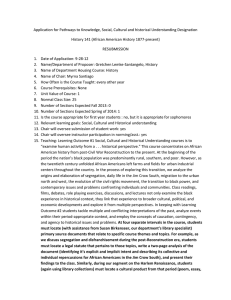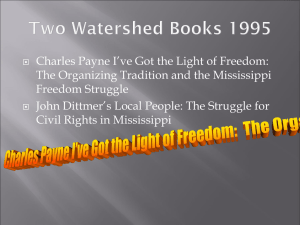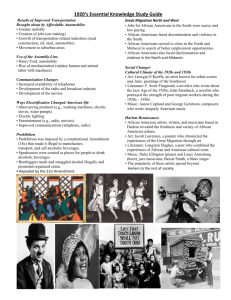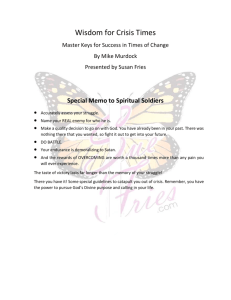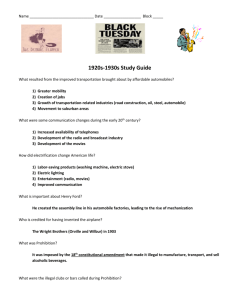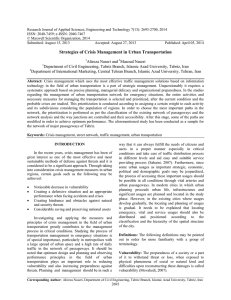Syllabus
advertisement
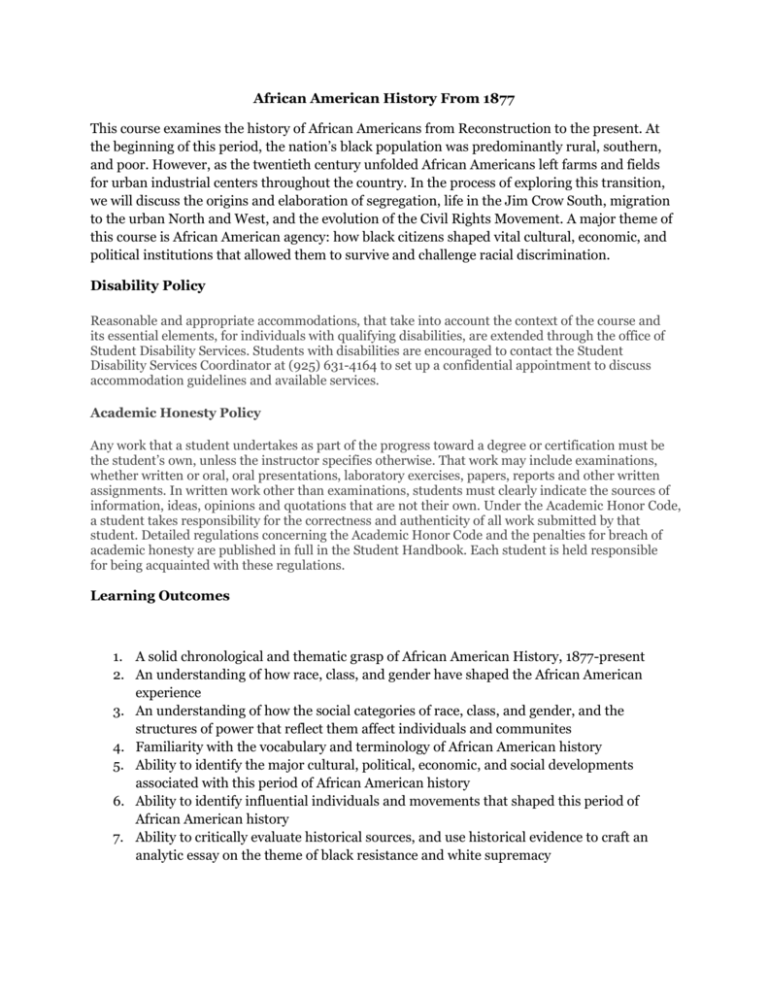
African American History From 1877 This course examines the history of African Americans from Reconstruction to the present. At the beginning of this period, the nation’s black population was predominantly rural, southern, and poor. However, as the twentieth century unfolded African Americans left farms and fields for urban industrial centers throughout the country. In the process of exploring this transition, we will discuss the origins and elaboration of segregation, life in the Jim Crow South, migration to the urban North and West, and the evolution of the Civil Rights Movement. A major theme of this course is African American agency: how black citizens shaped vital cultural, economic, and political institutions that allowed them to survive and challenge racial discrimination. Disability Policy Reasonable and appropriate accommodations, that take into account the context of the course and its essential elements, for individuals with qualifying disabilities, are extended through the office of Student Disability Services. Students with disabilities are encouraged to contact the Student Disability Services Coordinator at (925) 631-4164 to set up a confidential appointment to discuss accommodation guidelines and available services. Academic Honesty Policy Any work that a student undertakes as part of the progress toward a degree or certification must be the student’s own, unless the instructor specifies otherwise. That work may include examinations, whether written or oral, oral presentations, laboratory exercises, papers, reports and other written assignments. In written work other than examinations, students must clearly indicate the sources of information, ideas, opinions and quotations that are not their own. Under the Academic Honor Code, a student takes responsibility for the correctness and authenticity of all work submitted by that student. Detailed regulations concerning the Academic Honor Code and the penalties for breach of academic honesty are published in full in the Student Handbook. Each student is held responsible for being acquainted with these regulations. Learning Outcomes 1. A solid chronological and thematic grasp of African American History, 1877-present 2. An understanding of how race, class, and gender have shaped the African American experience 3. An understanding of how the social categories of race, class, and gender, and the structures of power that reflect them affect individuals and communites 4. Familiarity with the vocabulary and terminology of African American history 5. Ability to identify the major cultural, political, economic, and social developments associated with this period of African American history 6. Ability to identify influential individuals and movements that shaped this period of African American history 7. Ability to critically evaluate historical sources, and use historical evidence to craft an analytic essay on the theme of black resistance and white supremacy Readings Palmer, Passageways, Vol. II, 1863-1965 Litwack, Trouble in Mind Lewis, When Harlem Was in Vogue Lemke-Santangelo, Abiding Courage Sitkoff, Struggle for Black Equality Grading Class Participation and Attendance 15% Thesis/Interpretation Papers 10% Midterm 25% Final 25% Interpretive Essay 25% Schedule of Classes Tu. Feb. 9 Introduction Begin Trouble in Mind Th. Feb. 11 Reconstruction Passageways, pp. 1-32 Tu. Feb. 16 The Collapse of Reconstruction Passageways, pp. 33-45 Th. Feb. 18 Disfranchisement, Segregation, Debt Peonage, and Education Tu. Feb. 23 Film: Ethnic Notions Th. Feb. 25 Resisting Jim Crow: Washington, Du Bois, Racial Uplift, and Institution-Building Passageways, pp. 47-81 Tu. March 2 World War I and the First Great Migration Passageways, pp. 82-105 Th. March 4 Discuss Trouble in Mind/Thesis and Interpretation Papers Due Begin When Harlem Was in Vogue Tu. March 9 White Backlash and Black Resistance Passageways, pp. 106-129 Th. March 11 Film: The Killing Floor (daily life and labor in the urban north) Tu. March 16 The Harlem Renaissance Passageways, pp. 130-155 Th. March 18 Discuss When Harlem Was in Vogue/Thesis and Interpretation Papers Due Begin Abiding Courage Tu. March 23 The Great Depression Passageways, pp. 184-201 Th. March 25 Midterm Tu. April 6 World War II: The Double “V” and Second Great Migration Passageways, pp. 202-218 Th. April 8 World War II Continued Tu. April 13 Discuss Abiding Courage/Thesis and Interpretation Papers Due Th. April 15 Roots of the Second Reconstruction Passageways, pp. 219-237; Struggle for Black Equality, pp. 3-36 Tu. April 20 Film; Simple Justice (Brown v. Board of Education) Th. April 22 Film: Simple Justice Tu. April 27 Montgomery Bus Boycott Passageways, pp. 239-260; Struggle for Black Equality, pp. 37-60 Th. April 29 Student Sit-In Movement and Freedom Rides Struggle for Black Equality, pp. 61-117 Tu. May 4 Birmingham and the March on Washington Struggle for Black Equality, pp. 118-154 Th. May 6 Freedom Summer Struggle for Black Equality, pp. 155-183 Film: Freedom on my Mind Tu. May 11 From Civil Rights to Black Power Struggle for Black Equality, pp. 184-209 Th. May 13 Legacy of the Movement Struggle for Black Equality, pp. 210-235 Interpretive Essays Due Interpretive Essay: The interpretive essay consists of a typed, double-spaced, ten page paper that discusses and links together Trouble in Mind, When Harlem Was in Vogue, Abiding Courage, and the Struggle for Black Equality. This is where you demonstrate that you have read and thought about each book (do not use outside sources or lecture/discussion notes). Organize your essay around the theme of white supremacy and black resistance. Discuss what each book reveals about the dynamics and expression of white racism during the time period under consideration. Then describe what each book reveals about African American resistance. Be certain to consider all forms of resistance: institution building, self-help, migration, culture (literature, music, art, dance, etc.), economic independence, civil disobedience, education, etc. If you quote from the books, please cite page numbers. No late papers will be accepted. Exams: The midterm and final will be essay exams. Please bring bluebooks and at least two dark pencils or pens to class on the day of the exams. Study questions, from which the exams will be drawn, will be handed out in class one week prior to the test dates. The final will not be comprehensive. Make-up exams will be administered only in cases of illness (with a doctor’s excuse), or other documented emergencies. Thesis and Interpretation Papers In two pages, please summarize the author’s thesis, provide an overview of his/her sources, and assess the validity of her/his argument.
